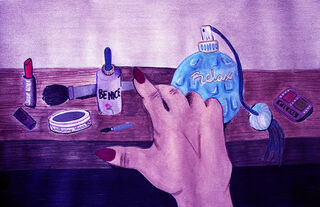Free Will
Fighting to Create a True Self
How is a true self created and how does free will affect it?
Posted August 21, 2021 Reviewed by Vanessa Lancaster
Key points
- Being authentic has merits for people pleasers or those who feel they must put up a facade.
- Research posits that much of what makes up an individual's self is determined by genetics, conditioning, and environment.
- Creating self entails recognizing thought origins, practicing new behavior, and being aware of the proneness to return to old behaviors.

In a recent Hidden Brain podcast entitled The Heat of the Moment, George Loewenstein, Ph.D., discussed the empathy gap. The empathy gap is defined as “our tendency to underestimate the influence of varying mental states on our own behavior and make decisions that only satisfy our current emotion, feeling, or state of being” (The Decision Lab).
The podcast detailed why people vow to eat healthier only to binge when hungry or how one promises to be less reactive only to shout angry words when triggered. Almost everyone can relate to wondering how they behaved a certain way once returning to a calm state of mind. Often it is as if we don’t know who we were at a given time.
There is a great deal of popular psychology that suggests you should be the real you. Rarely does a day go by without seeing a post about not worrying about what others think and just being your authentic self. In some ways, this has a positive effect. However, many studies and current theories suggest an “authentic you” is much more complicated than the average person may believe.
There are positives that come from behaving more authentically. Many engage in behavior they would rather not because of a tendency to please people. Others feel they must put on a facade or risk rejection.
I have written before about how a “true self” may not exist (The Human, Lion, and Multi-Headed Beast Inside, The Many Faces of You, You Aren’t You at All). To delineate where the true self exists begs the question, what has created it? According to research, the answer has to be a mixture of genetics, conditioning, and environment. Is that how you want the true you to be defined?
I contend that most would answer a resounding no. The entire value of free will depends upon it. If genetics, conditioning, and the environment determine my true self, then where is free will?
Many believe they are exercising free will when making decisions. Being Republican or Democrat has to be free-will, right? Psychological research says no, that genetic factors influence even a political party. In summing up research, psychologist Jay Van Bavel said, “If I had to place a bet, my money is on both outcomes: I suspect that our inborn brain structure guides us to political preferences, but that our political environment also alters our brain structure” (Goldhill, 2018). This quote identified that two factors largely shape political opinions, genetics and the environment. Research indicates this is true for much of what we think of as free will, as I have cited in previous writing on the topic.
With this in mind, one may want to ask, does the combination of genetics, conditioning, and environment comprise who I want to be? For me, the answer is absolutely not. I often joke in class that I was raised to be angry and miserable. Between my genetic predispositions (including mental health issues) and an environment where everyone seemed unhappy and mad at the world, my “true self” initially reacts to almost everything negatively. For example, I am inherently introverted and would rather be alone, or with someone, I care about rather than socialize generally. Invitations to get together with colleagues or friends often creates thoughts centering on how I’d rather not. However, these impulses can be detrimental to my well-being.
As such, you must create a self more to your liking. This requires mindfulness and a commitment to becoming who you want to be. Several techniques help with this. First, you must decide who you want to be. This must be done with reason and considering the limitations you face.
The dominant idea in psychology is that a person won’t change from night to day but can lighten the darkness (or mute the brightness). For example, if you are very introverted, you aren’t going to become the life of every party. But you can reasonably expect to make it to quite a few more social gatherings. Research also indicates that believing you are a new you, makes it more likely you'll act in accordance (Hoffman, 2015). So changing the verbiage from “I want to stop smoking” to “I don’t smoke” makes the desired behavior more likely.
Second, you must question your thinking and recognize the impact of genetics, conditioning, and environment. This creates doubt in initial, automatic thoughts and allows you to evaluate thoughts and replace them with those more in line with who you want to be. You must challenge thoughts that go against this new way of being. For example, if you're going to be more outgoing, there will likely be thoughts that suggest not to be today. It is essential to recognize these thoughts as conditioned and act against them.
Third, you must practice the new behavior until it becomes more automatic. In short, condition yourself to be different through repetition.
Finally, you remain at risk for relapse into old behaviors. Genetics and early childhood conditioning (not to mention years of repetitive behavior after) keep you at risk. It is better to view change as an ongoing process than something completed and left alone (for more on this, see my post Recovery for Everyone).
I am sure many people are happy with the combination of genetics, conditioning, and environment that have resulted in who they are. Perhaps they can quickly push aside darker selves and go through life happily, believing they are content with who they are and with the decisions they make. Even they would benefit from more true autonomy, but if it isn’t broken, why fix it? But those struggling with genetic predispositions and/or conditioning are left wanting and tasked with creating a self.
Copyright William Berry, 2021
References
The Decision Lab. 2021. https://thedecisionlab.com/biases/empathy-gap/
Goldhill, O. 2018. The shape of your brain influences your political opinions. Quartz. https://qz.com/1238929/your-political-views-are-influenced-by-the-size-…
Hoffman, B. 2015. The 5 most powerful self-beliefs that ignite human behavior. Elsevier. https://www.elsevier.com/connect/the-5-most-powerful-self-beliefs-that-…
Vedantam, S. Host and Executive Producer. 2021. You 2.0: In the Heat of the Moment. Audio Podcast Episode. Hidden Brain. Hidden Brain Media. https://hiddenbrain.org




